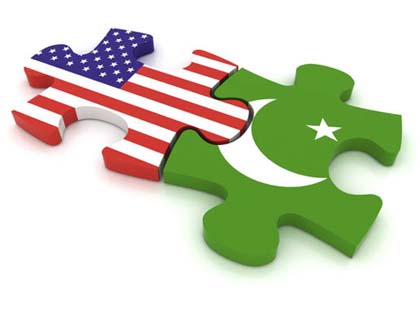Though Islamabad has been never content with the pres ence of foreign forces in Afghanistan and constantly voiced out irritation, but meanwhile never tried to cut ties with them. It kept the fledgling relation with the foreign forces, particularly with the US and remained committed to fight terrorism and al-Qaeda along with international community. However, there are allegations and statements that Pakistan has never been sincere with the promises made, but Islamabad officials have always rejected those allegations and blamed international community of punishing Pakistan for the sake of their own sin. It should be noticed.
Though, presently, more 30 countries have combating troops in Afghanistan, but the counterinsurgency struggle in Afghanistan is largely viewed as an American war. No matter how the US has struggled to brand the mission as international military efforts, but in reality it is US that bears the burden of war and pays largely for it. This is the concept that people around the world, including Pakistanis, hold true.
Therefore, since 2001,whatever went wrong by NATO involved troops in Afghanistan, it was the US flag and effigy of US presidents, whether former President MR. Bush or the current President Mr. Barack Obama, which were burned down by protestors in Pakistani States and cities.
The public hatred of US in the Pakistan has also hit the height and Pakistanis view Washington as main culprit of increasing violence in their country. When some important decisions are going to be made, it would be US officials sitting on the table with Pakistani counterparts and negotiate about the pros and cons of the decision and their impacts on AfPak, not any other involved countries.
And this notification was needed to understand that Islamabad views US as an authorized one to deal with, not other NATO members. Thus, any problem in diplomatic relation of Pakistan with US is necessarily means problem with the so-called international community's military involved here.
In this article, I try to explain about the impact of lethal NATO military attack that killed around 24 Pakistani security forces and injured many more. But before dealing with the issue, it is necessary to understand the issues which are worrisome for Pakistani government.
No doubt, the basis of establishment of diplomatic relation with a country is completely based on the political and economic benefits that a country acquires. Pakistan is also not an exception.
The outstation of Taliban regime in 2001, which had quite good and friendly relationship with Islamabad, left no choice ahead of the country to seek for its national interests somewhere else other then keeping support to an establishment an international coalition was built against.
Keeping support to Taliban was of course illogical and could lead global mass military forces towards Pakistan which certainly had destructive and lethal effect on the country. Islamabad chose to shift and ally with US and its allies to fight terrorism, al-Qeada and other terror and insurgency groups. That was the only choice that Pakistan could take in such critical time.
The easy outstation of Taliban regime unfortunately perverted decision makers, because after 2001 it was never anticipated that Taliban-led insurgencies would once again reestablish and appear a challenging force against foreign and Afghan security forces. Indeed, that military miscalculation is the main culprit behind the ongoing challenges in Afghanistan as well as Pakistan.
If Taliban was wiped out entirely, Pakistan too would not have faced challenges as it is wrangling with them now.
It is highly possible that due to strong international coalition against Taliban, al-Qaeda and their supporters got Pakistan to reassess it foreign strategy completely, but by the continuation of war and security crisis in Afghanistan, perhaps, a semi-turn back process commenced.
The continuance of security crisis restored lost confidence of Taliban supporters and, as time went on, a kind of public sympathy started growing for militants. Due to exposure of Pakistan to Afghanistan's incidents, the public sympathy has grown faster and faster in the country. The process has been further fuelled by US drone attacks across Afghanistan border, particularly, the drone attack in Aboteabad, which killed Osama bin Laden, al-Qaeda leader and the most wanted man.
The presence of US has led to acceleration of violence in the country. Based on the data at disposal, the cooperation with foreign forces, particularly US, in counter insurgency efforts has already cost Pakistan too much. Groups that were friends to the country are angry and have turned against it.
The level of violent activities has been rising. There are more target killings as well as more explosions go off in crowded areas. More importantly, several times, police and military quarters have been target by radical and extremist groups. The only behind was cooperation with foreign forces.
What Pakistani government can do in this circumstance?
The public opinion is against the presence of foreign forces in the neighboring country. The government is also under pressure to stop supporting to engaged forces in Afghanistan. when something goes wrong, people go mad and strongly ask Pakistan to cut ties, as occurred in the recent past incident just kms away from Afghanistan border.
Islamabad officials have to deal with two issues simultaneously—it should keep relation with the US and calm down civilians with the country.
In domestic sphere, Islamabad criticizes severely of US and threatens to cut all ties if such incidents take place once again to alleviate the aggrieved sentiment of people, on the other hand, is not willing to cut ties with US, because it benefits largely from the relation. Therefore, though the recent incident of killing Pakistani security forces has challenged the relation between two countries but certainly would end it to deadlock.

